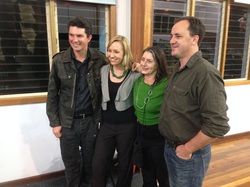 With the Bentley outcome a fresh momentary victory, the great big Green event, held at St John’s Hall in Mullumbimby last Saturday night, was a celebration of grass-roots activism. The Echo asked questions of three Green MPs before their appearance, and the night’s bill included federal senator Scott Ludlam (WA), senator Larissa Waters (Qld), and NSW Greens MP Jeremy Buckingham. What’s your bet on a double dissolution if the budget is blocked? MP Ludlam: There will most likely be a series of blocked bills that will just pile up month after month until these lunatics produce others. As long as Labor hold, we’ll be sending them back. At some point they have to decide whether to abandon this disastrous budget or come and talk to us. What’s your take on Clive Palmer and his ideas on taxation – do you agree that abolishing expected corporate tax earnings would inject billions into the economy? MP Ludlam: Palmer’s whole policy platform is tax evasion for his mining companies. He ran on that platform, and his cleverness is being able to disguise that while saying he is standing up for mums and dads. That’s real political artistry. But you don’t know what’s policy and what’s been made up on the spot. There’s still an element of genuineness in there that is obviously resonating with people and we shouldn’t ignore that. My prediction is that they won’t last a year once Abbott tries to buy his senators from him with various bribes and break the parliamentary block. Palmer’s policies have an interesting element of social justice – if he calls a press conference on the treatment of children on Manus Island, we’ll go and stand by him be cause he’s absolutely right. And he’s already proposing to block things in the budget. Do you know why we don’t have domestic protection for oil and gas reserves like they have in America and WA? MP Buckingham: What we don’t have in Australia is a national interest test. There’s no question asked by the government and the exporters about the triple bottom line: economic, social and ecological interests. [Mining company] Santos was recently exposed in one of their strategy documents when they were considering exporting. One of the things they recognised early on was that when they went to export they had parity to international prices. They could leverage their conventional gas off that export and get higher prices domestically. So what’s underpinned their business model from day one was higher domestic prices. They say more gas will put downward pressure on prices – well you can do that but it won’t make it cheaper. Are you all fans of rare- earth mining, which produces solar panels, magnets and computer chipboards as well as considerable toxic waste? Australian rare-earths mining company Lynas moved their processing plant to Malaysia after all political parties rejected their application to operate here. MP Ludlam: We met a number of times with Lynas, but they’re just going for the dollar. What Lynas tried to do was to export the high value jobs from their processing plants. They do the bulk mining in WA, then ship this radioactive sludge from Fremantle, which is very heavily populated, in plastic bags and it contains a lot of thorium. So the rare-earth minerals themselves aren’t radioactive, but they tend to co-exist with toxic ones. When it arrives in Malaysia they immediately throw all the thorium and radioactive sludge away into these tailings dams next to the refinery. And in Malaysia, they have had a real horror show with the rare-earth minerals. They have basically been tipping the radioactive sludges into the fields. So that sparked a very substantial counter-movement in Malaysia and we’ve been doing everything we can to support them. I’m not opposed to rare- earth mining, but that doesn’t mean your company should get a free pass on your social and environmental obligations. MP Buckingham: Our view is that we need them, and we introduced a bill into the NSW upper house called the Responsible Mining Bill. It recognises we need to keep making some steel and coked coal in the short term, but we need to be smarter about how we produce it. And there’s certain areas where mining is just too much of a risk.
0 Comments
Leave a Reply. |
Categories
All
Archives
November 2014
|
 RSS Feed
RSS Feed
